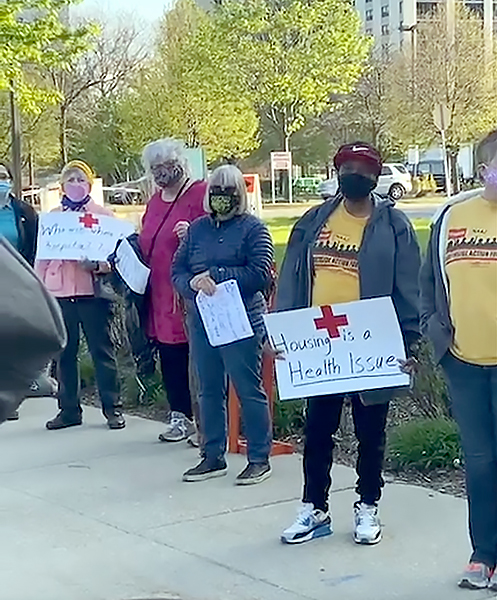CHICAGO, IL — When a private equity firm wants to build a luxury high-rise building in your community hospital’s parking lot, it’s time to take notice. When that equity firm also owns that hospital, you might feel a shiver of dread. When your community undergoes a massive gentrification push, yes, your hospital is threatened to close.
The Weiss Memorial Hospital in Uptown Chicago is such a target. The Weiss parking lot sits on prime lakefront land in an area of Uptown that has attracted developer attention for years. A national development firm, Lincoln Property Company, is under contract to buy the Weiss parking lot. The parking lot is zoned for medical and related purposes. It offers parking close to the Emergency Room, COVID-19 treatment tents, and a refrigerated container for COVID-19 bodies who have passed. It must be rezoned to build residential entities.
Weiss Hospital serves mostly low-income patients, but it has a range of medical subspecialties including age-friendly, gender-confirmation, and cardiac care. It has all the ingredients to do something innovative and creative.
In early 2019, California-based Pipeline Health bought Weiss and two suburban hospitals for $70 million; it closed one of those, Westlake Hospital in Melrose Park, within weeks of acquisition. Now it wants to sell the 43,000-sq.ft. parking lot that runs along Wilson Ave. between Marine Dr. and Clarendon Ave., Block Club reported last year.
Pipeline currently provides funding for Weiss to survive. With its track record of closing Westlake Hospital in Melrose Park in 2019, its declarations of keeping Weiss open are speculative. Pipeline laid off 52 workers at Weiss Hospital and West Suburban last year during the COVID pandemic due to “slow payment from the state,” according to the Chicago Tribune.
Weiss is the largest employer in the Uptown area, with over 700 employees. Last year Weiss served almost 22,000 patients, with approximately 20,000 emergency visits, 5,000 admissions and 2,000 surgeries. Over 73% of those patients came from the Uptown neighborhood.
Hospitals in the U.S. are estimated to be closing at a rate of about thirty per year. Most closures happen for financial reasons, in places where there are relatively few privately insured patients. Meanwhile, hospitals are increasingly run for profit. Globally, private-equity investment spent billions of dollars on acquisitions, causing price hikes, increased unnecessary procedures, and the destabilization of health-care networks.
“Since 2008, American hospitals have been involved in more than a thousand mergers and acquisitions, resulting in large, powerful health systems with influence on the price of hospital care and the reimbursement rates paid by private insurers. These conglomerates generally make up the losses incurred treating poor patients by building referral networks that attract privately insured patients seeking specialized care,” said The New Yorker.
Bad actors of private equity destroy American health care, and so does weak public investment and regulation. We need universal health care coverage to assure everyone accessible, quality health care. Life is sacrosanct, profit is not.
Kathy Powers is a lifetime Chicagoan. At 50, Kathy speaks out as the voice of the people. She became a revolutionary activist whose lifelong fight raises unheard voices. She is the Health Care Desk on the People’s Tribune Editorial Board.

